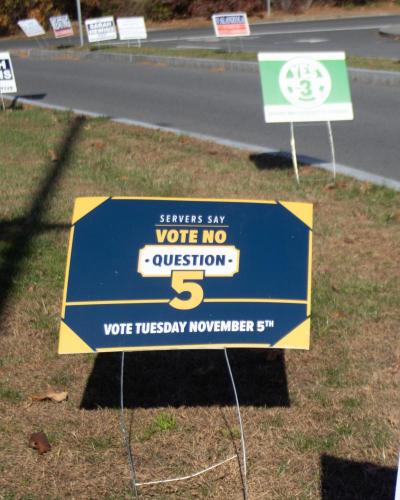Middleboro, Lakeville voters say yes to MCAS removal, no to driver unions
In addition to marking their top choice for candidates for president, national and state office seats, Middleboro and Lakeville voters also marked yes or no on five statewide ballot questions on election day.
All five referendum questions made their way onto the ballot by initiative petition, a process used by Massachusetts voters to gather public support for laws and propose them to the state legislature. If the legislature does not pass the proposed bill, the petitioner can collect more signatures from the public, if enough residents sign, the bill is then placed on the ballot for the next election.
Middleboro voted overwhelmingly in favor of Question 1, allowing the state auditor to audit the State Legislature with 9,517 voting yes and 3,943 voting no. In Lakeville, the measure received 5,268 yes votes and 2,132 no votes.
By passing the measure, voters gave the state auditor the authority to audit all “the accounts, programs, activities and functions” of the state legislature, according to the Secretary of the Commonwealth. [if measure fails see first sentence of section 12 of chapter 11 of the General Laws]
The Secretary of the Commonwealth’s information for voters booklet, which was mailed to every voter prior to Election Day, provided voters with supporting and opposing arguments for each proposed piece of legislation.
Supporters of Question 1 wrote in the booklet that approval would “shine a bright light” on the use of taxpayer dollars in the legislature, while those opposed to the law argued it would violate the Massachusetts state constitution.
A large majority of Middleboro and Lakeville voters decided to eliminate the MCAS requirement with 8874 Middleboro residents, marking yes and 4616 answering no to Question 2. In Lakeville, 4751 voters marked yes and 2,930 voters marked no.
The proposed law would have replaced the MCAS with coursework that demonstrated students had met the state academic standards for mathematics, science and English as well as any additional topics determined by the Department of Elementary and Secondary Education.
Those wishing to remove MCAS requirements argued that the standardized evaluation forces educators to teach to a test. Conversely, supporters labeled the requirements removal as “unfair” and “radical,” writing that the test is the only statewide graduation requirement.
Middleboro voters decided “transportation network drivers,” (who work for companies like Uber and Lyft), should not have the right to form unions with 5832 marking yes on Question 3 and 7308 marking no. Voters felt the same in Lakeville, with 4399 answering no and 3,059 answering yes.
The law allows “active drivers,” defined as workers who have completed more than the median number of rides in the last six months, to collectively bargain with their employers. The bill also establishes a hearing process for drivers to seek compensation for “unfair work practices,” according to the Secretary.
Arguments against the bill focused on benefits drivers already receive, like paid leave and a healthcare stipend, adding that drivers will “pay significant dues without real representation.” Supporters of Question 4 highlighted that rideshare drivers are one of the few worker groups without union representation in Massachusetts.
Voters in Middleboro and Lakeville decided not to allow Massachusetts residents over the age of 21 to grow, possess and use under supervision certain psychedelic substances with 4,706 voting no and 2,897 voting yes in Lakeville, and 7908 voting no and 5442 voting yes in Middleboro.
The proposed law would have allowed residents age 21 or older to possess a personal use amount of psilocybin, psilocyn, dimethyltryptamine, mescaline and ibogaine and grow the substances in a 12 by 12 foot area at their home. The law prohibited the retail sale of any of the substances but allowed for their purchase and use in a therapeutic setting.
Those in opposition to the bill cited health risks, a potential increase in residents driving under the influence and concerns over “black market” trade of the decriminalized substances. Supporters argued the use of psychedelic substances to treat PTSD, depression and anxiety would help veterans and others who suffer from mental illness.
The majority of voters in both towns voted against increasing the hourly wage of tipped workers, presented on question five. In Lakeville, the number of no votes on this issue was 6,155 and the number of yes votes was 1506. In Middleboro, 10,819 voters answered no and just 2,640 voted yes.
The bill created a timeline for the employers of tipped workers, gradually increasing their employees hourly pay until it matched minimum wage by 2029. The law included an allowance for “tip pools,” equally splitting workers' tips among all employees, if the establishments hourly wage matched the state minimum wage.
Supporters of the bill claimed that many small businesses already pay their tipped workers minimum wage while large corporations do not.
“Tips should be a reward for good service, not a subsidy for the low wages paid by large corporations,” supporters wrote in the booklet.
Those in opposition wrote that the bill would reduce overall wages for tipped workers, increase operation costs for restaurants and raise the price of dining.













